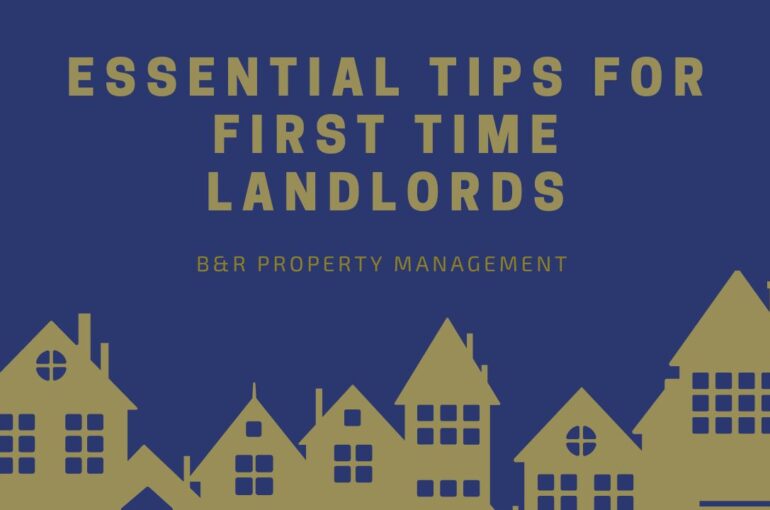Essential Tips for First Time Landlords
Essential Tips for First Time Landlords

Becoming a first-time landlord can be both exciting and challenging, especially for apartment owners. To ensure success in this new venture, it’s crucial to develop a strong foundation. Use these essential tips for first-time landlords to help you navigate your rental business and set you up for long-term success.
1. Treat Your Rental Property as a Business
As a landlord, you should view your rental property as a business. Establish clear boundaries and foster professionalism in your interactions with tenants. Here are some ways to start treating your property like a business:
- Develop a Business Plan: Outline your goals, strategies, and financial projections for your rental property. This will help you make smart decisions and stay on track with your objectives.
- Establish a Bookkeeping System: Maintain accurate records of your income and expenses, such as rent payments, maintenance costs, and utility bills. This will help you track your property’s financial performance and make tax preparation easier.
- Create a Marketing Strategy: Develop a marketing strategy that showcases your property’s unique selling points and reaches your target audience.
2. Familiarize Yourself with Local Housing Laws
Understanding housing laws and regulations is essential for first-time landlords. This knowledge will help you stay compliant, avoid potential legal issues, and protect your property and tenants. Some areas to focus on include:
- Fair Housing Laws: Ensure that your rental practices adhere to federal, state, and local fair housing laws prohibiting discrimination based on race, color, national origin, religion, sex, familial status, or disability.

- Tenant Rights and Responsibilities: Familiarize yourself with your tenants’ rights and responsibilities. This will help you build a positive relationship with your tenants and avoid potential conflicts.
- Landlord Responsibilities: Know your legal responsibilities as a landlord, which can include maintaining a safe and habitable property, addressing maintenance requests promptly, and providing proper notice before entering a tenant’s unit.
3. Craft a Comprehensive Lease Agreement
A well-written lease agreement is always essential. Take the time to create a thorough and legally compliant lease that covers all relevant aspects of the rental, such as:
- Rent Payment Terms: Specify the amount, due date, and acceptable payment methods for rent. Clearly outline the consequences of late or missed payments, such as late fees or eviction proceedings.
- Security Deposit Details: Include information about the security deposit, such as the amount required, how it will be used, and the timeline for returning it upon lease termination.
- Maintenance and Repair Responsibilities: Clarify which maintenance and repair tasks are the responsibility of the landlord and which are the responsibility of the tenant.
- Rules and Regulations: Outline the rules and regulations for your rental property, such as noise restrictions, guest policies, and pet policies. Be sure to enforce these rules consistently to maintain a harmonious living environment for all tenants.
4. Screen Potential Tenants Thoroughly

Finding responsible tenants is crucial. Conducting a thorough screening process can help you identify potential red flags and minimize the risk of future problems. Some aspects of a comprehensive tenant screening process include:
- Credit Check: Review the applicant’s credit history to assess their financial responsibility and ability to make timely rent payments.
- Employment and Income Verification: Confirm the applicant’s employment status and income to ensure they can afford rent payments.
- Background Check: Perform a background check to identify any criminal history or past evictions that may raise concerns about the applicant’s suitability as a tenant.
- References: Contact previous landlords and personal references to gather additional information about the applicant’s rental history, reliability, and character.
5. Be Proactive with Property Maintenance
Maintaining a rental property in good condition is essential for both part-time and full-time landlords. A well-maintained property will attract and retain quality tenants, preserve the property’s value, and minimize costly repairs down the line.
- Conduct Regular Inspections: Perform routine inspections to identify potential maintenance issues before they become more significant problems. This can include checking for water leaks, pest infestations, and structural damage.
- Address Maintenance Requests Promptly: Respond to tenant maintenance requests in a timely manner, as neglecting these issues can lead to further property damage and strained landlord-tenant relationships.
- Invest in Preventative Maintenance: Take a proactive approach to maintain your property by investing in preventative measures, such as regular pest control treatments, gutter cleaning, and HVAC system maintenance.

6. Establish Open and Effective Communication with Tenants
Building strong relationships with your tenants is key to a successful rental business. Establishing open and effective communication channels can help you address issues promptly, resolve conflicts, and foster a positive living environment.
- Create Clear Expectations: Set clear expectations for tenant behavior, maintenance responsibilities, and communication protocols from the beginning of the lease term.
- Be Accessible and Responsive: Provide multiple ways for tenants to contact you. Respond to tenant inquiries and concerns promptly, even if it’s just to acknowledge receipt and let them know you’re working on a resolution.
- Keep Tenants Informed: Notify tenants of any upcoming inspections, maintenance work, or changes to property rules and regulations. Provide ample notice and follow local laws regarding entry into tenant units.
7. Hire a Professional Apartment Management Company
It’s recommended to work with an experienced property manager if you’re not familiar with the ins and outs of operating a rental property business. Even seasoned landlords find it more convenient to hire a reputable property manager to help them manage their rental business.
- Choose a Property Manager with a Good Track Record: Determine the property manager’s level of experience and ensure they can handle your property well.
- Find an Apartment Manager Who Is Well-Versed in the Law: With the right property manager, you can rest assured that you’re always in compliance with the law.

- Work with a Property Manager Who Cares about Your Bottom Line: The property manager’s primary goal is to ensure that your investment is profitable and in good hands.
Conclusion
Being a first-time landlord can be both exciting and overwhelming. It may with unexpected tasks, such as having to learn how to do deal with a previous tenant’s mail, but it can be an increadibly rewarding endeavour.
Use the above tips to get started and hire a professional apartment manager to take care of your business. Contact B&R Property Management and we’ll be happy to assist you!



